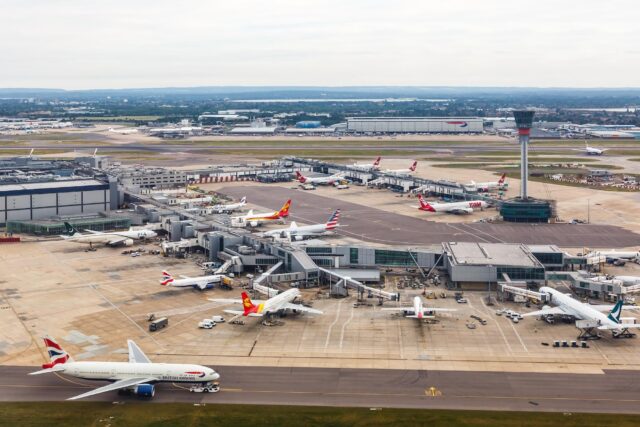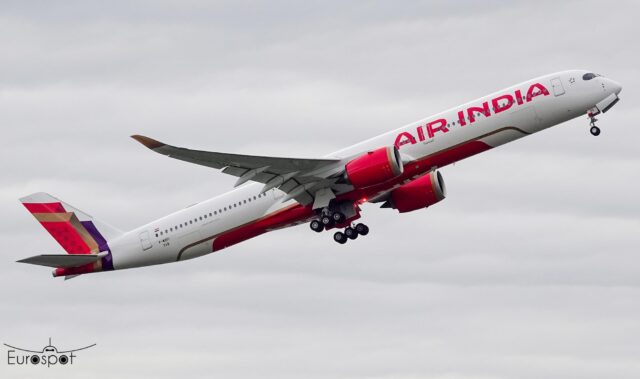Streaming meets shopping: Viasat and InterLnkd help airlines cash in on WiFi with AirMall

October 12, 2025

InterLnkd has partnered with Viasat to offer the in-flight satellite connectivity provider’s airline customers access to AirMall, a digital in-flight shopping mall that enables carriers to monetise in-flight WiFi service. The companies announced their collaboration at the World Aviation Festival in Lisbon.
AirMall joins Viasat’s Connected Partner Platform
Viasat will add AirMall to its Connected Partner Platform, which hosts applications that help the satellite services provider’s airline customers enhance their in-flight connectivity.
Airlines can adopt AirMall through existing portal infrastructure and deploy it quickly across their fleets, with no additional onboard hardware or software required.

Over 60 airlines around the world are connected through Viasat’s service. By switching on AirMall, they can offer customers a global retail channel featuring over 20,000 brands, which will present passengers with a personalised selection of products and provide delivery to their home or destination.
“Many airlines are keen to find smart, scalable ways to earn revenue from inflight connectivity, especially as demand for the Wi-Fi onboard accelerates globally,” said Nathan Clapton, VP of Inflight Media at Viasat. “Through our partnership with InterLnkd, airline partners can choose to push the boundaries of inflight retail without heavy IT investment – delivering a stronger passenger experience while driving new revenue.”
InterLnkd: from booking ancillaries to WiFi monetisation
Aerospace Global News spoke with Barry Klipp, CEO of InterLnkd during the World Aviation Festival, to learn more about the pre-flight and in-flight retailing platform. Klipp is a former airline executive with experience in developing ancillary sales channels at Singapore Airlines, Air Asia and easyJet.
“I used to run ancillary revenue for the nine airlines of the Air Asia group and I was actually involved in the pre-book collect-on-board or collect-at-airport duty-free,” he said. “So I’ve been involved in that world.”
This airline retail experience inspired Klipp to consider more opportunities to offer air travellers the products they need (or might want) for the journey. With his partners, Klipp launched InterLnkd four years ago as a way to monetise bookings by offering airline customers a selection of fashion, beauty, and retail curated around their travel plans.
It was initially a post-booking, pre-departure service until Viasat approached InterLnkd to consider its in-flight sales potential, as a means of helping airlines to monetise WiFi.
Free WiFi is an expensive proposition for airlines
“There are only a few ways you can actually monetise WiFi,” Klipp told AGN. “Not a lot of people are willing to pay for it. They want it, but they’re not willing to pay for it.”
One solution, Klipp noted, is to offer time-limited WiFi enabled through ad revenue, where passengers watch an ad before connecting. Another is to monetise it through airline loyalty programs.
Klipp said that the entry of Starlink into the in-flight connectivity market is prompting more airlines to offer free WiFi services, but that generosity comes with a serious disadvantage.

“Airlines have realised if you give it away free, the usage goes up, which is a bit of a problem,” he said. “It’s a double-edged sword because you want customers to use it, but then it starts using the data, and the data costs money.”
What AirMall provides is a way for airlines to earn revenue from their customers’ WiFi dwell time, to help offset the cost of data. Airlines receive a share of AirMall sales onboard.
Klipp explained that the AirMall platform’s ‘travel stylist’ engine will use passenger data from WiFi login to curate personalised product recommendations around the passengers’ destination, enhancing engagement and conversion.
“That whole personalisation relevancy is a little bit of magic in the shopping mall,” Klipp said. “But if you just wanted a shop as per e-commerce, you can do that as well.”
AirMall: redesigning in-flight retail
AirMall also addresses passengers’ desire for in-flight retail in a more practical way than duty free trolleys or even in-flight retail magazines. It frees airlines from having to manage inventory or delivery, reducing logistical burdens, fuel costs, and customer dissatisfaction when the items they want are out of stock.
The business model is a referral marketplace where retailers and brands stock items and handle shipping directly. In addition to well-known brands, InterLnkd has added retail chains like Macy’s, Bloomingdale’s, and CVS in the U.S., as well as popular retailers in Europe, the Middle East, and Asia.

Klipp told AGN that while InterLnkd has successfully built up a considerable offering through its retail partnerships, the company will also consult with airlines for guidance on the retailers that will appeal most to their customers.
“There’s a huge opportunity to expand it to target the retailers that you actually shop in. Yes, you might buy some alcohol at the airport. Yes, you might buy tobacco. I’m not sure there are that many people going through buying a Cartier watch these days—maybe there are—but, actually, in truth, that’s not what you do as a consumer,” Klipp said.
“You book a beach holiday and you’re probably going to buy a suntan lotion, and you might want that delivered to your hotel. So, because you’re flying to New York, you’ll buy it from CVS and have it delivered to your hotel. So that’s the world we’ve built, enabling that through the commercial deals that we’ve done with retailers.”
AirMall is an agnostic retail platform which airlines can deploy with ease
Through the new partnership with Viasat, Klipp is optimistic that AirMall will take off.
“There does appear to be quite a lot of interest in it, which is wonderful for a startup,” he said. “[Airlines] want to talk to us and understand how it works. It can be seamlessly switched on because of Viasat’s connected passenger portal.”
Klipp noted that airlines may have more than one in-flight connectivity service provider in their fleet, but they can still easily deploy AirMall as an in-flight service enhancement and an ancillary revenue stream.
“The solution we’ve built is actually agnostic to the WiFi provider,” Klipp said. “We’re now having discussions with the other WiFi providers who may want to offer this to their clients.”
Klip told AGN that the company has already signed a contract with an airline to introduce AirMall service on in-flight WiFi, though he was unable to disclose details at this time.
















